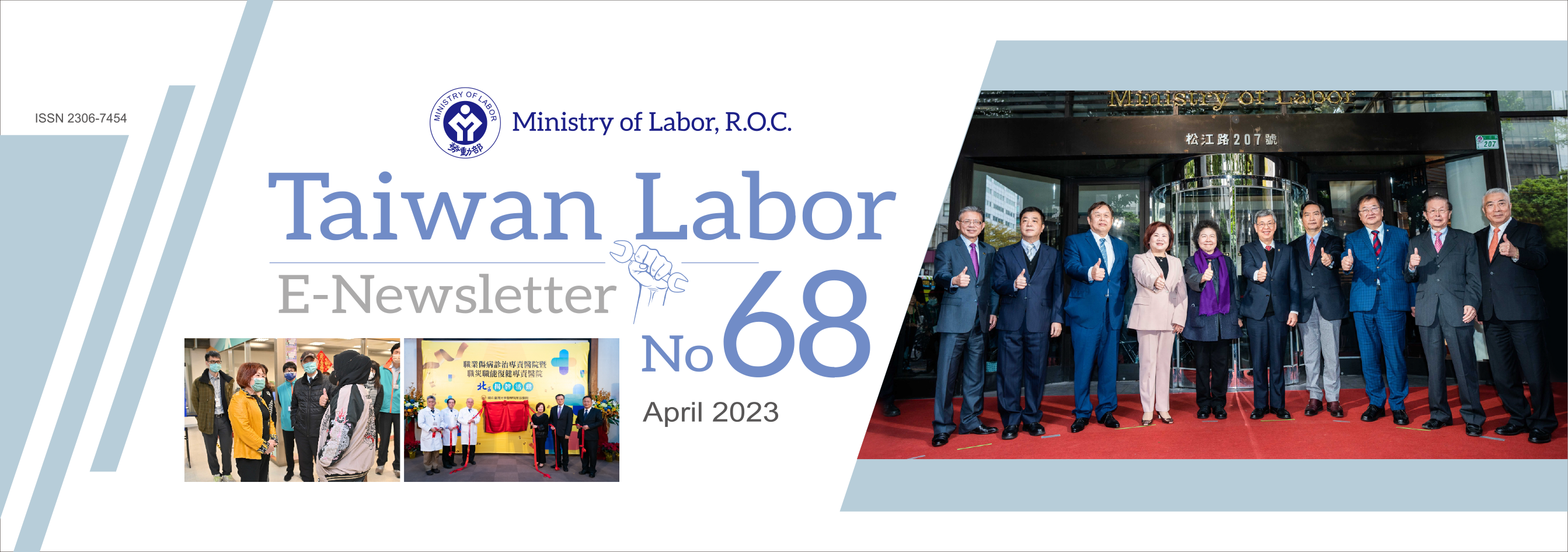NO.68
- Last updated:2023-04-28
- Clicks on the following title, but browses this article fast
- Policies & Regulations The Ministry of Labor Formulates the "Guiding Principles for Agreements between Worker and Employer on Wage Payment Dates and Wage Payment" to Promote Reasonable Agreements of Wage Payment Matters Between Worker and Employer, and to Ensure the Rights and Interests of the Worker Labor Insurance Rights and Interests Unaffected Where Laborers Report for Work Or Resign on a Holiday
- News Outlook Ministry of Labor Unveils New Service Milestone Minister Hsu Ming-Chun of the MOL Visits the One-Stop Service Center to Understand the Entry Orientation Status of Household Foreign Workers Service Initiated At Occupational Disaster Occupational Rehabilitation Recognized Hospitals, Helping Laborers Suffering from Occupational Disaster Return to Work Safely Equal Pay Day in Taiwan for 2023 Is February 27
The Ministry of Labor Formulates the "Guiding Principles for Agreements between Worker and Employer on Wage Payment Dates and Wage Payment" to Promote Reasonable Agreements of Wage Payment Matters Between Worker and Employer, and to Ensure the Rights and Interests of the Worker

The Ministry of Labor (MOL) formulated the "Guiding Principles for Agreements between Worker and Employer on Wage Payment Dates and Wage Payment" on February 9, 2023 to stipulate the reasonable range of wage payment dates agreements between worker and employer as well as the timeline of promotion by local competent authorities etc. The main contents are described as follows:
- This guideline stipulates that the frequency of payment agreed between worker and employer shall not be less than once a month.
- If the wage payment date agreed between worker and employer is 15 (or more) days later than the expiry of the wage period, the local competent authority shall immediately assist the business entity in adjusting the wage payment date forward; the local competent authority shall also assist the business entity in progressively adjusting the wage payment date forward year by year according to the schedule.
- Where the wage payment date has not been agreed for overtime pay and double wages for working on holidays, the wage shall be paid on the nearest wage payment date or paid in conjunction with the current monthly salary; where an additional wage payment date or wage period has been agreed upon, the frequency of payment shall not be less than once a month and the wage shall be paid within 15 days upon the expiry of the wage period.
- Where worker and employer have separately agreed upon quarterly, semi-annual or annual settlements and the payment of special bonuses, the payment date agreement shall nevertheless be reasonable.
- Where the wage payment day falls on a holiday, the employer may pay in advance or on the originally agreed wage payment date, which cannot be postponed arbitrarily.
The Guideline offers administrative guidance to help and encourage business entities to move forward with improvements according to the schedule, therefore no penal provisions have been formulated. The overall schedule spans over 4 years with buffer periods between each objective to be attained so that business entities are able to adjust their wage payment operations and finances accordingly. Different objectives have also been set for business enterprises of different scales to lessen the difficulty in adjustment by small and micro enterprises. This is to ensure that all business entities are able to transition one step at a time in joint efforts to protect the rights and interests of workers receiving wages.
The full text of the Guideline may be downloaded from MOL's official website.
Keywords: Labor Standards Act, Salary Payment, Labor Contract
Labor Insurance Rights and Interests Unaffected Where Laborers Report for Work Or Resign on a Holiday
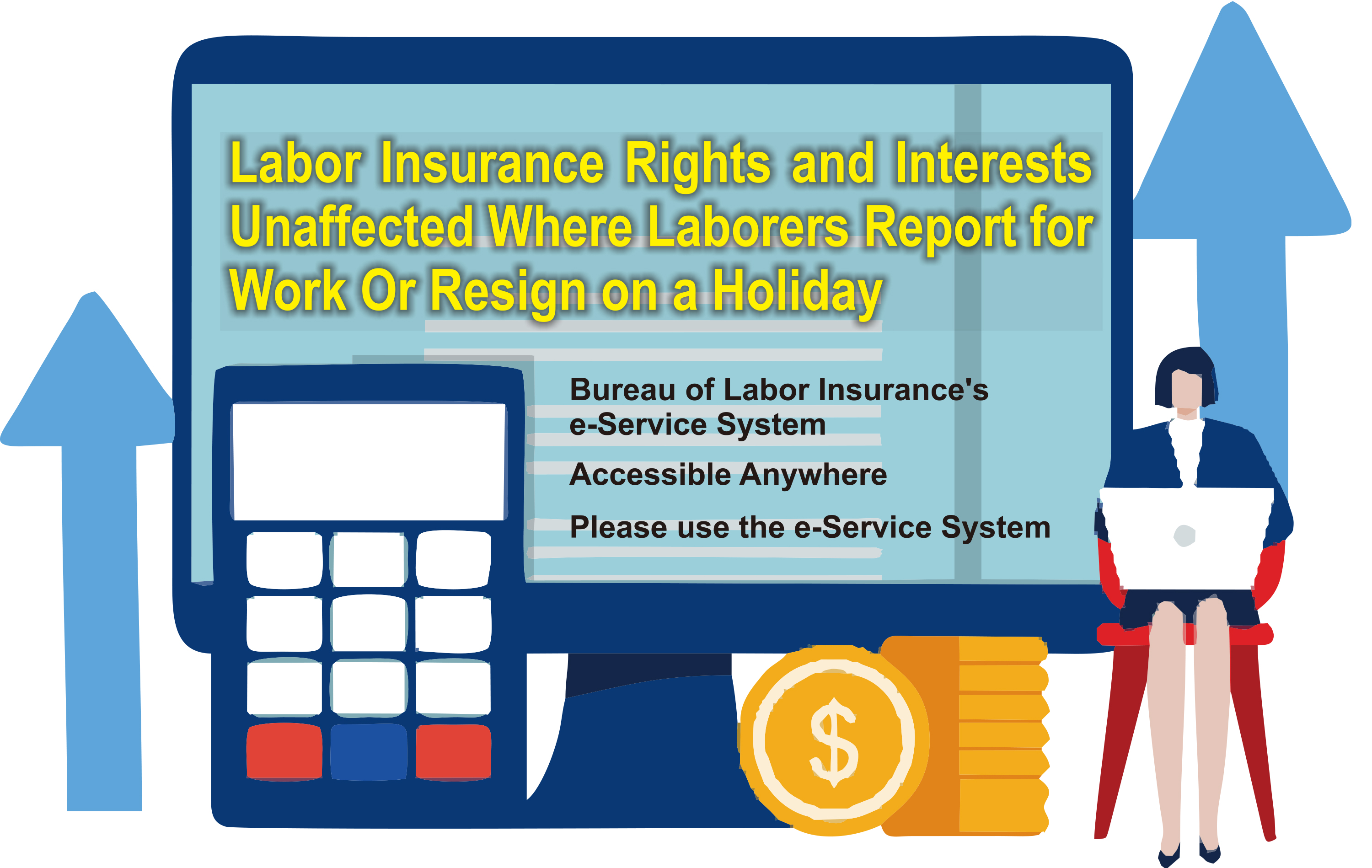
To protect the economic and living security of laborers, based on the regulations stipulated in the Labor Insurance Act, insured units shall apply for or cancel insurance enrollment with the insurer (Bureau of Labor Insurance, BLI) on the date the employed laborer reports for work or resigns, and the effectiveness of labor insurance shall begin or end on the date of application or cancellation. According to the Ministry of Labor (MOL), based on relevant regulations stipulated in the "Enforcement Rules of the Labor Insurance Act", laborers who report for work or resign on a statutory holiday of the insurer, after 17:00 and before 24:00, or on a day work is suspended as announced based on local government regulations (such as due to typhoons), the insured unit shall deliver or mail the labor insurance enrollment or cancellation application form and documentary proof of start of employment to the insurer on the next work day at the latest. The effectiveness of labor insurance shall begin or end on the date the laborer reports for work or resigns so as to ensure the laborer's insurance enrollment rights and interests.
For example, the MOL explains, if a laborer reports for work on a Saturday and the BLI is not open for services, the insured unit shall deliver or mail the laborer's labor insurance enrollment application form and documentary proof of start of employment to the BLI on the following work day (i.e. Monday). The effectiveness of the labor insurance in which said laborer is enrolled shall be valid starting from 00:00 on the date on which he or she reported for work (i.e. Saturday), meaning the laborer shall be under the coverage of labor insurance starting from the aforementioned time.
Additionally, to facilitate insurance enrollment and cancellation operations for insured units, the BLI provides a range of flexible application methods. For instance, where laborers report for work or resign on a holiday, units applying through the Internet can perform insurance enrollment or cancellation using the BLI's "e-Service System", or perform insurance enrollment or cancellation online in advance within 10 days before the laborer is expected to report for work or resign. Insured units are therefore encouraged to take advantage of these services that are available anywhere, anytime.
Keywords: Labor Insurance Enrollment or Cancellation, Reporting for Work Or Resigning on a Holiday, Online Advanced Insurance Enrollment Or Cancellation
Ministry of Labor Unveils New Service Milestone
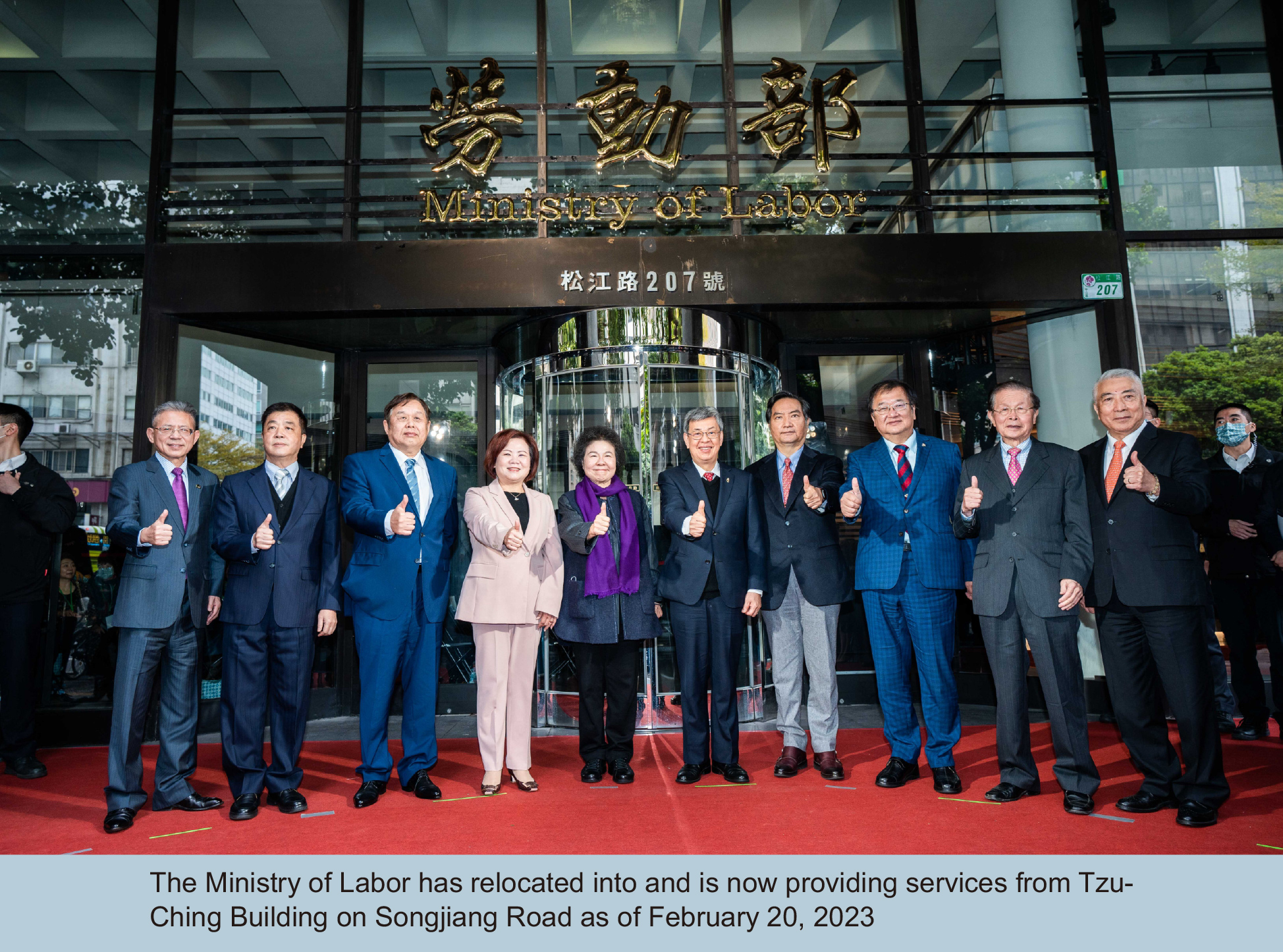
On February 22, 2023, Premier Chen Chien-Jen of the Executive Yuan, President Chen Chu of the Control Yuan and distinguished guests including representatives of laborer and employer organizations gathered at the new offices of the Ministry of Labor (MOL) to witness and unveil an all-new milestone for the services provided by the MOL.
Premier Chen first thanked the entire labor force of Taiwan for their contribution to the nation's development, and emphasized that the government is committed to creating a high quality working environment in response to challenges in international economic trade competition to further ensure and protect labor rights and interests. He also expressed hopes that all colleagues working for the MOL continue to extend their empathy and kindness toward laborers and employers alike by attending to their worries and concerns, so that all citizens who are part of Taiwan's labor force can truly experience the dedicated care provided by their government.
Meanwhile, Minister Hsu Ming-Chun of the MOL took the opportunity to introduce the various outcomes of labor policies that have been launched over the years, including amendments to the "Labor Insurance Act", substantial amendments to the "Act for Settlement of Labor-Management Disputes", formulation and promulgation of the "Employment Service Act", extension of the applicable scope of the "Labor Standards Act", promulgation of the "Act for Protecting Worker of Occupational Accidents", formulation of the "Act of Gender Equality in Employment" and the "Labor Pension Act", amendments to the three labor laws, and promulgation of the "Middle-aged and Elderly Employment Promotion Act" and "Labor Occupational Accident Insurance and Protection Act", etc. The MOL has also established the Labor Rights and Interests Fund to assist laborers in overcoming economic difficulties encountered during the course of litigation procedures, while also launching a labor insurance annuity system to ensure the economic security of laborers who choose to retire. Also in place is the Invest in the Youth Employment Program that integrates resources from across multiple government entities to improve the status of youth employment.
Lastly, Minister Hsu thanked the entire workforce of the MOL for their hard work and dedication, and declared that the MOL will continue to promote labor-related policies based on the values of "service, care, professionalism, and innovation" to ensure that all citizens in the nation's labor force have access to better welfare and greater security.
The MOL has relocated into and is now providing services from Tzu-Ching Building on Songjiang Road as of February 20, 2023. If you have any questions regarding labor issues, you are welcome to visit the MOL (address: No. 207, Songjiang Road, Zhongshan District, Taipei City; service hotline: 02-8995-6866; labor consulting and grievance hotline: 1955).
Keywords: Ministry of Labor, Labor Policy, Tzu-Ching Building
Minister Hsu Ming-Chun of the MOL Visits the One-Stop Service Center to Understand the Entry Orientation Status of Household Foreign Workers
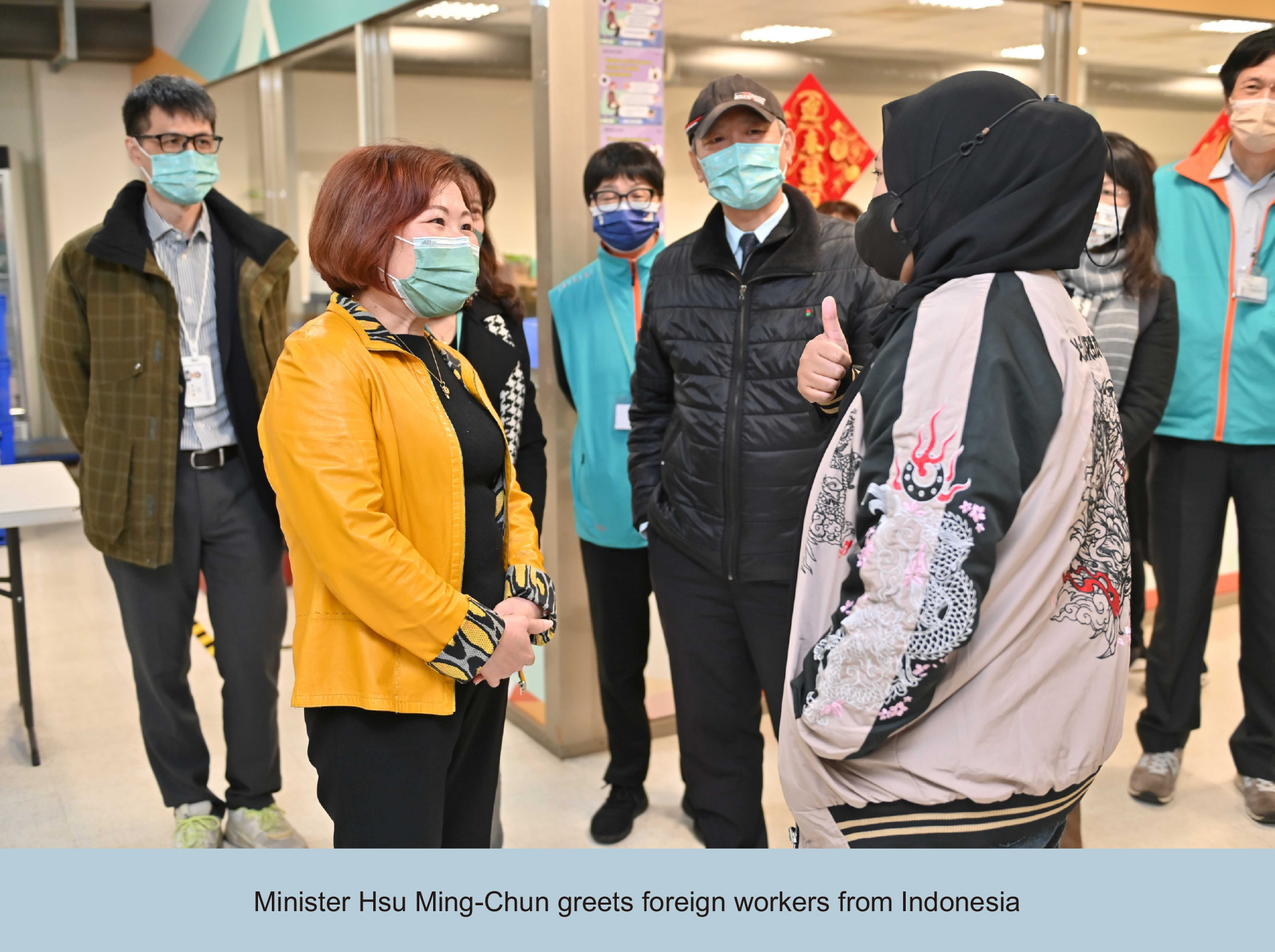
To streamline the application process for employers and enhance the labor rights awareness of foreign workers, the Ministry of Labor (MOL) began offering one-stop services for foreign workers as of January 1, 2023, providing newly employed household foreign workers with entry orientation services over the course of a three-day period. Minister Hsu Ming-Chun of the MOL and her team visited the Migrant Workers One-Stop Service Center on February 7, 2023 to inquire into the training and living circumstances of foreign household workers employed in Taiwan for the first time and participating in entry orientation. Apart from offering good wishes for the new year, she commended the center's staff members for their efforts and commitment in taking turns offering services during the lunar new year holidays.
After personally examining the operations carried out at the one-stop service center and ensuring streamlined operations on all fronts, Minister Hsu applauded the staff for their dedication and the center's efforts in ensuring all courses offered during entry orientation for foreign workers are conducted smoothly while responding at all times to changes in flight statuses that lead to changes in personnel dispatch and transportation as well as adjustments to accommodation requirements resulting from a wide range of emergencies and contingencies. These daily challenges are adequately addressed, providing both employers and foreign workers with smooth and satisfactory services.
Minister Hsu also extended her care and welcome to the foreign workers participating in entry orientation by wishing them well for the new year and hoping they succeed at their posts. Although workers from Vietnam shared that their nation differs from Taiwan in that it celebrates the Year of the Cat in 2023, the one-stop service center is no less friendly and accommodating on this account with all the new year cheer and warmth that it offers. Meanwhile, despite not being in the habit of celebrating the lunar new year, foreign workers from the Philippines expressed delight in joining in the center's festivities and the opportunity to experience a different culture. One particular worker who had previously been employed in Taiwan a decade ago, Rizka Dessi Amanda from Indonesia, recalls that one-stop services were not yet available back then, and that she is extremely happy to enjoy access to more information on living in Taiwan, work-related matters, her legal rights and interests as well as channels for consulting and communication. Last but not the least, all foreign workers were happy with the accommodations and meals offered at the center.
The MOL is committed to attending to every foreign worker's and their employer's needs. To help foreign workers become accommodated to life and work in Taiwan within the shortest time possible and streamline the administrative procedures that employers must undergo, the Ministry is now offering one-stop services to facilitate the employment of foreign workers in the future and to ensure workers and their employers cooperate in greater harmony.
Keywords: Ministry of Labor, Migrant Workers One-Stop Service Center, Entry Orientation for Foreign Workers
Service Initiated At Occupational Disaster Occupational Rehabilitation Recognized Hospitals, Helping Laborers Suffering from Occupational Disaster Return to Work Safely
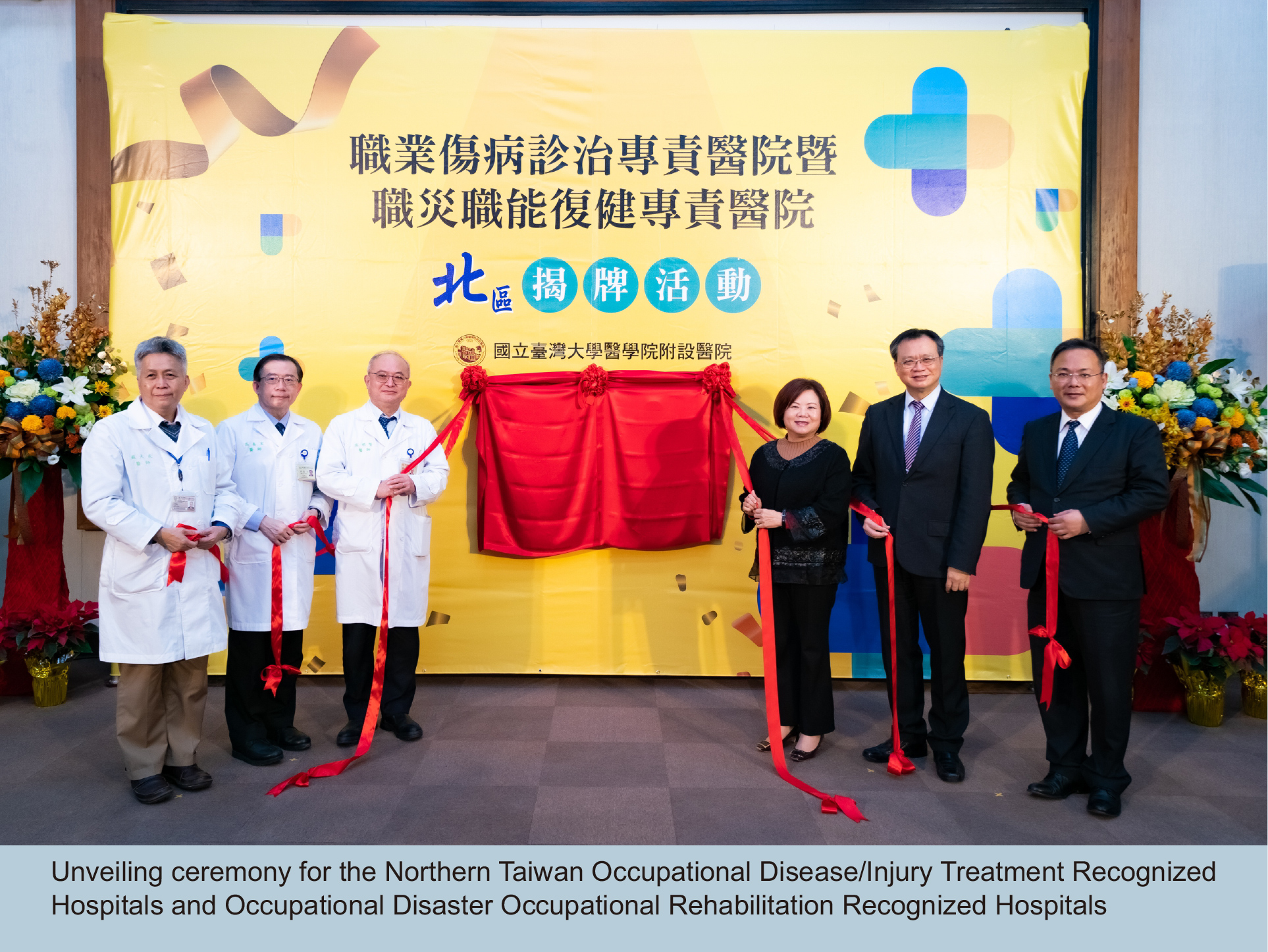
To reinforce the assistance provided to laborers seeking occupational rehabilitation, 28 occupational disaster occupational rehabilitation recognized hospitals approved by the Ministry of Labor (MOL) have officially begun offering medical services to help laborers suffering from occupational disasters or their employers formulate plans for helping workers return to work. Through analysis of the work carried out by the laborer suffering from occupational disaster, evaluation of functional abilities, enforced training for enhancing physical and mental functions, trained professionals can better understand the needs of laborers seeking to return to work and help them set goals for elevating their capabilities. This will ensure that laborers suffering from occupational disaster return to work within the shortest timeframe, reducing the time as well as medical and social costs expended while laborers wait or attempt to return to work.
The MOL calls on all laborers suffering from occupational disasters or their employers to seek assistance from the nearest occupational disaster occupational rehabilitation recognized hospital if occupational rehabilitation services are needed. Professional therapists will perform personalized evaluations, assist with return-to-work plans for laborers suffering from occupational disaster. Relevant consulting and referral services are also provided by professional service personnel at local labor administration competent authorities. For further information, please visit the official website of the Occupational Safety and Health Administration (OSHA).
Keywords: Occupational Disaster Laborer Rehabilitation, Occupational Disaster Occupational Rehabilitation Recognized Hospital, Return to Work
Equal Pay Day in Taiwan for 2023 Is February 27

In order to raise public awareness for equal pay, the Ministry of Labor (MOL) has once again announced Equal Pay Day for this year. Since average earnings for different genders depend on a number of factors other than gender, such as the nature and category of the job, seniority, education, and job experience, narrowing the gender pay gap is a common goal for all sectors of society.
Taiwan's Equal Pay Day is based on the Employee Earning Survey (hereinafter referred to as the salary survey) conducted by the Directorate-General of Budget, Accounting and Statistics (DGBAS) under the Executive Yuan and reflects the number of days women must additionally work in the current year starting from January 1 to earn the same amount as men did the previous year based on the difference in hourly pay between the two genders. According to compilation results, in 2022, Taiwanese women earned an average hourly salary of NT$314, 84.2% of men's hourly rate of NT$373. The gender pay gap was 15.8%. In other words, women needed to work 58 more days (gender pay gap of 15.8% x 365 ≈ 58 days) than men to receive the same total annual salary. Using this formula, it was determined that Equal Pay Day fell on February 27 for 2023, the same as last year.
Based on observations of data from the past 4 years, Taiwan's gender pay gap fell from 14.9% in 2019 to 14.8% in 2020, meaning women had to work an additional 55 and 54 days in 2019 and 2020 respectively, while the gap rose again to 15.8% in 2021 and 2022, which translates to an additional 58 work days compared to men. From 2021 to 2022, the increase in average hourly pay was the same for men and women at 3.2%, therefore there was no fluctuation in the gender pay gap.
Over the years, Taiwan's gender pay gap has been smaller than that in the U.S., Japan, Republic of Korea and other countries, and at 15.8% in 2022, the number continues to be lower than Japan and Republic of Korea's (2021) 30.2% and the U.S.'s 17%.
Keywords: Equal Pay Day, Average Hourly Earnings, Gender Pay Gap
- Source:Department of General Planning
- Publication Date:2023-04-28
- Count Views:
File
- Taiwan Labor E-Newsletter No68 pdf

